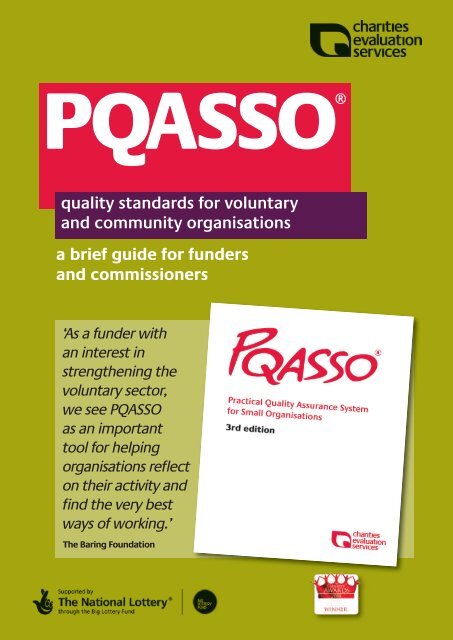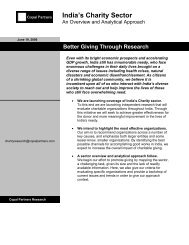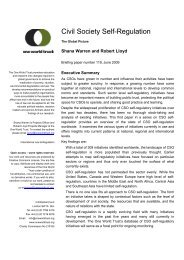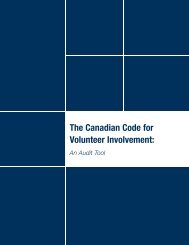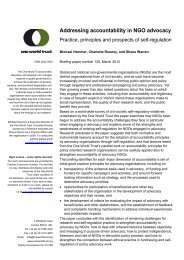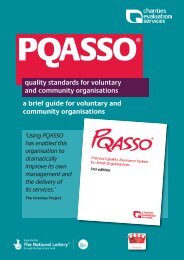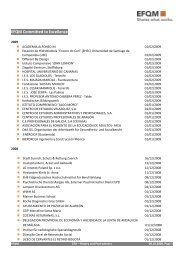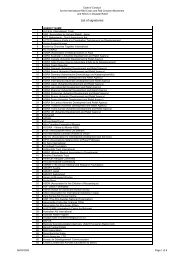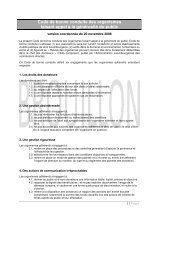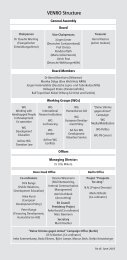PQASSO - One World Trust
PQASSO - One World Trust
PQASSO - One World Trust
You also want an ePaper? Increase the reach of your titles
YUMPU automatically turns print PDFs into web optimized ePapers that Google loves.
<strong>PQASSO</strong><br />
®<br />
quality standards for voluntary<br />
and community organisations<br />
a brief guide for funders<br />
and commissioners<br />
‘As a funder with<br />
an interest in<br />
strengthening the<br />
voluntary sector,<br />
we see <strong>PQASSO</strong><br />
as an important<br />
tool for helping<br />
organisations reflect<br />
on their activity and<br />
find the very best<br />
ways of working.’<br />
The Baring Foundation
<strong>PQASSO</strong> – the Practical Quality Assurance System for Small Organisations – is the<br />
most widely used quality assurance system in the UK voluntary and community<br />
sector. 13,000 copies of <strong>PQASSO</strong> have been sold to small, medium and large<br />
organisations in the UK. It is also increasingly being used internationally.<br />
This guide provides some basic information about <strong>PQASSO</strong> for<br />
funders and commissioners.<br />
2<br />
What is <strong>PQASSO</strong>?<br />
<strong>PQASSO</strong> is an ‘off the shelf’ quality assurance<br />
system. It offers a practical step-by-step approach<br />
to enable voluntary and community organisations<br />
to improve the way their organisation runs and to<br />
help them to improve the quality of their services.<br />
Designed as a workpack, it is written in plain<br />
English and is simple and straightforward to use.<br />
<strong>PQASSO</strong> covers 12 quality standards:<br />
Planning<br />
Governance<br />
Leadership and management<br />
User-centred service<br />
Managing people<br />
Learning and development<br />
Managing money<br />
Managing resources<br />
Communications and promotion<br />
Working with others<br />
Monitoring and evaluation<br />
Results.<br />
<strong>PQASSO</strong> offers a staged approach to<br />
implementing quality through three levels of<br />
achievement. Very small or newly formed<br />
organisations may decide just to work towards<br />
achieving level 1. After achieving level 1,<br />
established or more complex organisations may<br />
decide to progress to level 2 and then perhaps<br />
to level 3. Each level provides guidance on what<br />
is required to run a healthy, efficient and<br />
effective organisation.<br />
‘Using <strong>PQASSO</strong> has enabled this<br />
organisation to dramatically<br />
improve its own management<br />
and the delivery of its services.’<br />
The Octobus Project<br />
How does <strong>PQASSO</strong> benefit<br />
an organisation?<br />
Organisations using <strong>PQASSO</strong> can gain the<br />
following benefits:<br />
more effective and efficient organisational<br />
systems and procedures<br />
better quality of service for users<br />
increased motivation for staff, trustees<br />
and volunteers<br />
better communication among staff, trustees<br />
and volunteers<br />
more creative thinking which, in turn, encourages<br />
fresh perspectives and new ways of working<br />
increased organisational learning<br />
continuous improvement over time.<br />
<strong>PQASSO</strong> focuses strongly on outcomes. As well<br />
as helping organisations to plan and implement<br />
improvements, <strong>PQASSO</strong> also gives them a<br />
framework to measure the differences that such<br />
changes actually make to an organisation and<br />
its service users.<br />
What services are available to<br />
support <strong>PQASSO</strong> users?<br />
Charities Evaluation Services – the author and<br />
owner of <strong>PQASSO</strong> – offers a range of services to<br />
support organisations to implement <strong>PQASSO</strong><br />
or to consider doing so.<br />
Training<br />
We offer a range of training courses in London<br />
on how to implement <strong>PQASSO</strong>. Wherever<br />
organisations are based in the UK, we can also<br />
offer 'in house' training at that location.<br />
Next Steps in Quality: <strong>PQASSO</strong> in Practice<br />
This no-nonsense publication is a practical and<br />
detailed guide to the <strong>PQASSO</strong> implementation<br />
process.
Licensed <strong>PQASSO</strong> mentors<br />
A UK-wide network of trained mentors – development<br />
workers, consultants and other professionals – have<br />
been licensed by Charities Evaluation Services to offer<br />
training and support to help organisations wishing to<br />
implement <strong>PQASSO</strong>.<br />
<strong>PQASSO</strong> CD-ROM<br />
The CD-ROM is an information management tool that<br />
can be used alongside the <strong>PQASSO</strong> workpack. It helps<br />
organisations to plan and monitor their progress in<br />
implementing <strong>PQASSO</strong>, manage the self-assessment<br />
process, record their evidence and develop action<br />
plans. It also allows organisations to print their<br />
<strong>PQASSO</strong> records in a variety of formats. The latest<br />
version of the CD-ROM includes features to support<br />
an organisation to prepare for a <strong>PQASSO</strong> Quality<br />
Mark peer review. Please note that it is not possible<br />
to implement <strong>PQASSO</strong> using the CD-ROM alone.<br />
For more information about these services,<br />
please contact Charities Evaluation Services on<br />
020 7713 5722 or at enquiries@ces-vol.org.uk<br />
or visit www.ces-vol.org.uk<br />
‘The Quality Audit Team at Bradford<br />
Council promotes <strong>PQASSO</strong> as a<br />
generic quality assurance framework<br />
to voluntary organisations funded<br />
through the commissioning process.<br />
To date we have introduced <strong>PQASSO</strong><br />
to 141 groups, ensuring their ongoing<br />
development through its common<br />
sense and focused approach.’<br />
Bradford Council<br />
How are the <strong>PQASSO</strong> standards<br />
assessed?<br />
<strong>PQASSO</strong> is designed as a self-assessment tool.<br />
This means that organisations assess themselves<br />
against the quality standards using an evidencebased<br />
method to ensure reliability.<br />
In response to demand from our users, we introduced<br />
the <strong>PQASSO</strong> Quality Mark service in 2008. This is for<br />
organisations that require an externally assessed<br />
‘kitemark’ to validate their progress made through<br />
self-assessment.<br />
The <strong>PQASSO</strong> Quality Mark is the external<br />
assessment service for <strong>PQASSO</strong> users. It<br />
offers accreditation against either level 1 or<br />
level 2 of the <strong>PQASSO</strong> quality standards. We<br />
hope to offer accreditation against level 3 in<br />
2009.<br />
Achieving the <strong>PQASSO</strong> Quality Mark shows<br />
that an organisation’s achievement against<br />
the <strong>PQASSO</strong> standards has been verified<br />
externally. This means that, before applying,<br />
an organisation must have self-assessed<br />
against its chosen level of <strong>PQASSO</strong>; it must<br />
be confident that it has fully met all the<br />
requirements of <strong>PQASSO</strong> at that level and<br />
have evidence to demonstrate this.<br />
The external assessment is carried out by<br />
peer reviewers – members of the voluntary<br />
and community sector who have been<br />
specially trained by Charities Evaluation<br />
Services. Peer reviewers have the credibility<br />
that comes from working within the sector<br />
and from having used <strong>PQASSO</strong> themselves.<br />
The fee for a <strong>PQASSO</strong> Quality Mark peer<br />
review depends on the size of the<br />
organisation and the level at which it is<br />
being reviewed.<br />
Organisations may contact you to seek<br />
grant funding to pay for a <strong>PQASSO</strong> Quality<br />
Mark peer review. The full cost of a peer<br />
review will include the review fee and peer<br />
reviewers’ travel and subsistence expenses.<br />
Organisations may also seek funding to assist<br />
with their implementation of <strong>PQASSO</strong> and<br />
preparation for a review.<br />
For more information about the<br />
<strong>PQASSO</strong> Quality Mark, and details<br />
of the costs involved, visit<br />
www.pqassoqualitymark.org.uk<br />
or email pqm@ces-vol.org.uk<br />
Organisations can use <strong>PQASSO</strong> as a self-assessment<br />
tool with or without gaining the externally assessed<br />
<strong>PQASSO</strong> Quality Mark. Both approaches will<br />
benefit organisations.<br />
3
The next four pages illustrate one of the 12 quality areas covered by <strong>PQASSO</strong>:<br />
this example focuses on monitoring and evaluation.<br />
<strong>PQASSO</strong> – an example from the workpack<br />
Each of the 12 quality areas starts with the standard<br />
and the benefits of the standard, and then describes<br />
the elements of what the standard covers.<br />
4
Indicators show broadly what an organisation should be doing to meet its desired level<br />
of <strong>PQASSO</strong>. Self-assessment involves different people in the organisation discussing how<br />
well the organisation is doing against the indicators and whether any improvements are<br />
needed. This example shows indicators for level 2.<br />
5
6<br />
Sources of evidence offer some ideas about where an organisation<br />
might look for evidence to demonstrate that it has met the<br />
indicators. This example shows sources of evidence for level 2.
Where self-assessment shows that an organisation needs to make some organisational<br />
improvements, it will need to develop an action plan. <strong>PQASSO</strong> includes a range of<br />
templates to help organisations to carry out an initial self-assessment, record their evidence<br />
and devise an action plan.<br />
7
frequently asked questions<br />
8<br />
What costs and resources are associated<br />
with implementing <strong>PQASSO</strong>?<br />
The <strong>PQASSO</strong> workpack costs £95 and the CD-ROM costs<br />
£54 (including VAT, excluding postage and packing).<br />
Organisations should also budget for the cost of staff<br />
time needed to implement <strong>PQASSO</strong>, as well as possible<br />
associated training or support costs. Organisations also<br />
need to allow for the costs associated with making the<br />
necessary organisational improvements that arise out of<br />
<strong>PQASSO</strong> implementation. There are additional costs if an<br />
organisation wishes to gain the <strong>PQASSO</strong> Quality Mark.<br />
Is <strong>PQASSO</strong> only appropriate for small<br />
voluntary and community organisations?<br />
<strong>PQASSO</strong> has been used successfully by small, medium<br />
and large voluntary and community organisations,<br />
including small volunteer-run organisations and large<br />
multi-sited organisations with over 100 staff.<br />
How long will it take an organisation<br />
to implement <strong>PQASSO</strong>?<br />
The time taken to implement <strong>PQASSO</strong> will vary among<br />
organisations. A well-functioning organisation may be<br />
able to meet the standards at their desired level of<br />
<strong>PQASSO</strong> within a few months, whereas for other<br />
organisations requiring more improvements it may<br />
take much longer. Research suggests that<br />
organisations which allow plenty of time to engage<br />
properly in the <strong>PQASSO</strong> process are more likely to<br />
gain significant organisational benefits (Paton 2003).<br />
How can funders tell whether an<br />
organisation is implementing<br />
<strong>PQASSO</strong> properly?<br />
<strong>PQASSO</strong> is an evidence-based system. Organisations<br />
need to document the evidence to demonstrate that<br />
they have fully met the relevant <strong>PQASSO</strong> standards. In<br />
gauging whether organisations have made meaningful<br />
progress in implementing <strong>PQASSO</strong>, Charities Evaluation<br />
Services encourages an open dialogue between<br />
organisations and their funders. There are a number of<br />
ways that organisations can demonstrate their progress<br />
to funders, including progress reports, evaluation<br />
reports, feedback from users and so on. If they wish,<br />
organisations could also show funders the records of<br />
their sources of <strong>PQASSO</strong> evidence. Organisations may<br />
also wish to gain the <strong>PQASSO</strong> Quality Mark as a way of<br />
demonstrating their achievement.<br />
Is <strong>PQASSO</strong> the right quality system for all<br />
voluntary and community organisations?<br />
<strong>PQASSO</strong> is a very flexible quality system written<br />
specifically for the voluntary and community sector<br />
and is therefore the most widely used ‘off the shelf’<br />
system in the sector. However, research conducted by<br />
Aston Business School advises funders of ‘the critical<br />
importance of allowing and encouraging VCOs to<br />
make informed choices about quality systems (in<br />
particular whether they are likely to fit with<br />
organisations’ mission, culture and capacity)’ (CVAR<br />
2004). Furthermore, ‘there is clear evidence from the<br />
study that the adoption and use of quality systems is<br />
more likely to be a positive and beneficial experience<br />
if the process is negotiated jointly between VCOs and<br />
their funders’ (ibid). It is important that a quality<br />
system integrates with an organisation’s work, rather<br />
than being viewed as an ‘add-on’.<br />
At what level of <strong>PQASSO</strong> is an organisation<br />
fit to deliver contracted services?<br />
For smaller and less complex organisations, the<br />
achievement of <strong>PQASSO</strong> at level 1 demonstrates that<br />
the organisation is healthy, efficient and effective for<br />
its level of activity. However, achievement of one of<br />
the three levels of <strong>PQASSO</strong> will not correspond<br />
directly to an organisation’s ability to deliver<br />
commissioned services. At the same time - bearing<br />
in mind the nature and size of the organisation - the<br />
use of <strong>PQASSO</strong> will be a useful consideration<br />
alongside the remit and experience of the<br />
organisation, and the evidence it produces of its<br />
ability to fulfil the contract requirements.<br />
How does <strong>PQASSO</strong> fit with other<br />
quality approaches?<br />
There is inevitably cross-over between <strong>PQASSO</strong> and<br />
other quality systems, so the previous or current use<br />
of another quality system should assist with<br />
implementing <strong>PQASSO</strong>. However, organisations and<br />
funders should be aware that the use of multiple<br />
systems will impact on staff time and resources.<br />
References<br />
CVAR at Aston Business School (2004) The Adoption and Use of<br />
Quality Systems in the Voluntary Sector: A Briefing for Funders.<br />
On behalf of the Quality Standards Task Group and Charities<br />
Evaluation Services.<br />
Paton, Rob (2003) ‘Using Quality Models in Self-assessment’.<br />
In Managing and Measuring Social Enterprises. London: Sage<br />
Publications Ltd.<br />
For more information about <strong>PQASSO</strong> and its<br />
related services – or to purchase copies of the<br />
<strong>PQASSO</strong> workpack, CD-ROM or other<br />
publications – please contact:<br />
Charities Evaluation Services<br />
4 Coldbath Square<br />
London EC1R 5HL<br />
t 020 7713 5722<br />
f 020 7713 5692<br />
e enquiries@ces-vol.org.uk<br />
w www.ces-vol.org.uk<br />
This guide was developed with support from Tracey<br />
Chadwick (London Borough of Tower Hamlets) and<br />
Matthew Smerdon (Baring Foundation).<br />
Company limited by guarantee in England and Wales, number 2510318<br />
VAT registration number 564 5833 16<br />
Registered charity number 803602<br />
Registered office address: CES, 4 Coldbath Square, London EC1R 5HL<br />
Designed by Wave Published July 2008


